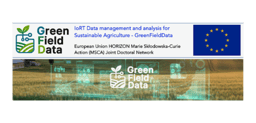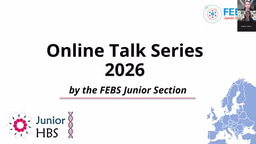
Whilst studying Biomedical Sciences as an undergraduate at Oxford Brookes, UK, I was offered the opportunity to take part in a parasitology-based research project for my dissertation, a setting in which I thrived, sparking a desire to begin a career in scientific research. Upon finishing my undergraduate degree, I contacted many PIs who ran laboratories centred on parasitology research, and this led me to meet Prof. Anthony Walker, an inspiring supervisor who offered me a place in his group at Kingston University. There I completed my Master by Research degree, followed by a PhD, both of which focused on cell signalling biology in the parasite Schistosoma mansoni. Towards the end of my PhD, I decided to explore potential career opportunities that remained in the research world, without being based in a laboratory. This led me to my current role as an Assistant Editor for The FEBS Journal, where I have been for the past 9 months.
I start my day by…
There is no such thing as a typical day as an assistant editor – the job role is incredibly varied depending on current deadlines and priorities. However, I tend to begin my day by checking my email – working at an international journal, I will often have received author queries throughout the night, which are important to respond to promptly. There are also some key tasks that I do routinely, such as approving provisionally accepted manuscripts following editorial checks, which is usually task number two on my to-do list at the start of a working day.
My primary role is…
To perform editorial checks on revised papers that have been accepted for publication following peer review, to ensure that they adhere to journal format and style. I then check these editorial changes have been completed by the author, before sending the finished article on to our production team. Another key role is coordinating the Special Issues for our journal. This includes liaising with Guest Editors to coordinate compilation of these issues from invitation through to production and then contributing to the promotion of these issues. I also help commission and developmentally edit content from authors; in particular, I commission ‘Commentaries’, which are an article type in The FEBS Journal focused on accepted articles that have been highlighted by a member of our team as being of particular importance. In addition to this, I provide support to the commissioning editors for ‘Viewpoints’ and ‘Structural Snapshots’, two review article types published in The FEBS Journal. Finally, I also manage the journal’s social media accounts, ensuring extra visibility of each of the papers we publish.
I work alongside…
I work closely with a small editorial team: editorial manager Paraminder Dhillon, deputy editorial manager Manuel Breuer and editorial assistant Giannina Bartlett. I am also in regular contact with editorial board members (https://febs.onlinelibrary.wiley.com/hub/journal/17424658/editorial-board/editorial-board) and the Editor-in-Chief of the journal, Seamus Martin, particularly to discuss Special Issues. I feel very fortunate to work with this experienced team; as a newbie in the editorial world they have helped me develop and hone my editorial skills and have provided a solid base to the beginning of my career. I hope to continue working alongside this team and continue to draw from their experience.
My most visited websites are…
The majority of our work pipeline is carried out using the online manuscript submission tool ScholarOne – this is where authors submit their manuscripts, and where we then send them out for review, make decisions and liaise with authors, referees, editorial board members and the production team at various stages in the submission process. Other regularly visited websites are our own journal website – https://febs.onlinelibrary.wiley.com/journal/17424658 – to keep an eye on content and of course Twitter, where I predominantly run the social media for FEBS J.
There is a balance between working on my own and as part of a team…
Much of my working pipeline is solo work, and I have a to-do list that I am continually adding to and updating. I do, however, communicate with my colleagues on a daily basis, often to ask questions or get their input when an issue arises (or we fancy a quick chat!). We also hold bi-weekly journal meetings, where the four of us discuss what we have been up to, what needs to be done moving forward and how we can assist each other. During the pandemic we have also implemented a ‘virtual coffee break’ for those in our office team who fancy a coffee and a catch up, which counteracts the lack of human contact during this time.
There are many other tasks in this role…
This job does not just consist of editing and approving authors’ manuscripts and commissioning articles. One task I thoroughly enjoy is running our journal’s social media accounts. Scientific research is often highlighted on Twitter and using this platform I promote our current issues, articles of particular interest, competitions and prize-winners, and it also offers me the ability to engage with the scientific community in a different but rewarding way. We recently ran a unique creative communication competition, in which entrants were asked to convey what ‘re-opening the lab' life looks like after initial COVID-19 lockdown measures have been eased. I also was offered an exciting opportunity to help write a Minireview article alongside the editorial team which aimed to clarify the current scientific view behind several COVID-19-related claims or controversies that have been widely discussed in the media, which can be found here: https://febs.onlinelibrary.wiley.com/doi/10.1111/febs.15442.
I’m finding the skills and experience I draw on most in this role are…
The role naturally requires a lot of editing, and my writing and editing skills are greatly improving with each article I work on. As well as the on-the-job training I get, FEBS have kindly offered me the opportunity to attend formal training courses to help develop these skills. Communication is an integral skill used in this job: I have frequent dialogue with authors, editorial board members, commissioning editors and my team, so efficient communication is key. Most importantly I draw on my organisational skills – as the job role is so varied, I tend to dip in and out of tasks throughout the day depending on their importance and so it is imperative I remain organised to ensure that all these tasks are completed well and in a timely manner.
I decided to move into editorial work because…
There are a number of reasons I moved into editorial work. Whilst I loved academic research and working in a wet lab, I felt that progressing in this world opened you up further to the pressure to publish, win grant money and work very long hours, all with the lack of job security. I therefore looked for job opportunities where I could still be involved in research without working directly in academia. Editorial work quickly became my preferred choice: it gives me the chance to read about fascinating research from a huge variety of laboratories as well as communicating and building relationships with scientists globally. I still feel deeply connected to the research world and I am constantly inspired by the potential of scientific research with each paper I read.
I end my working day by…
I am quite an organised person, so I end my day by ensuring that my to-do list for the day is completed and update any additional tasks on it so I am ready to hit the ground running the following day. I then close my laptop and head straight to the park to walk my dog! Working from home can blur the lines with regards to working hours, so I find distancing myself from my laptop prevents overworking and potential burnout. I also have a strict policy to not check emails in the evenings/weekends – we all deserve down-time, and no one wants to read email during a Netflix marathon!
What I like about my work is…
The reason I love my job is the variability in tasks – whilst the core pipeline provides a constant source of work, there are a multitude of other tasks I can dip in and out of keeping me constantly stimulated and interested, and no two days are exactly the same. I also thrive on the communication element in my job; I love contact with authors, particularly building relationships through commissioning work and guiding invited authors through the writing and submission process. Of course, a huge benefit – pre-pandemic - was getting the opportunity to occasionally travel internationally to conferences where I can throw myself completely into the research world, by watching scientists present their cutting-edge research and discussing their work with them.
My advice to early-career researchers interested in a career in journal editorial work is…
To do it! Ask journals for internships; this can give you an excellent insight into the editorial world and whether it is right for you, showing you the variety of work involved in this career. Editorial work places you in the centre of ground-breaking research, allowing you to talk to amazing authors and work with inspiring colleagues from a variety of backgrounds.





Join the FEBS Network today
Joining the FEBS Network’s molecular life sciences community enables you to access special content on the site, present your profile, 'follow' contributors, 'comment' on and 'like' content, post your own content, and set up a tailored email digest for updates.
If you liked what you read as much as we do, consider applying for the Assistant Editor role on Molecular Oncology: https://febs.onlinelibrary.wiley.com/hub/journal/18780261/job-posting-2020